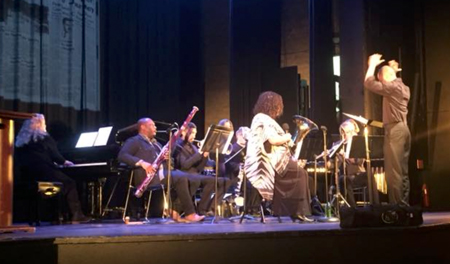“Dead King Mother” & The 50th Anniversary of Dr. King’s Assassination

Last summer, I ran into my friend and composer/drummer Davu Seru and he asked me if I would be interested in singing in a piece he was developing called Dead King Mother.
He called it a blues for chamber ensemble and told me that it was inspired by his aunt Arlene who raised his cousins on her own after her husband, Davu’s uncle, was arrested for killing a white man (John F. Murray) the evening that Dr. King was assassinated.
Davu told me about seeing his Uncle Clarence at his aunt’s funeral. His uncle thanked his aunt for raising their children, stating that he had been way and that some people at the funeral knew where he was. Davu was struck by the fact that his uncle didn’t offer any kind of explanation or apology to Arlene and wondered what she might have said to Clarence in response.
I was particularly interested in the piece because it raised questions about the experiences of the people, especially the women, around these historical actors (King and Uncle Clarence).
…
Flash forward to September of last year and the first rehearsal for the piece. This was the first time I heard elements of the piece and ensemble, which at the time I believe was marimba, piano, percussion and clarinet(?). Davu had outlined the melody I would sing, but the text was not set. He sang the vocal lines for me in a clear, flute-like head voice.
In January, we began rehearsing the piece with the full ensemble. The complete chamber ensemble would include flute, flugelhorn, clarinet, bassoon and tuba, as well as vibraphone, percussion and piano. And Davu would conduct the piece, not perform it. When asked about the instrumentation, Davu said, “I write for the instruments I want to hear. *smile*
…
We debuted Dead King Mother in February and then performed it on the 50th anniversary of King’s assassination. Members of Clarence Underwood and John F. Murry’s families were at all of the performances.
As we rehearsed and presented the work, I noticed that audiences kept wanting the piece to be something other than what it was. Davu had a written a blues, but someone asked him if it was an aria from a larger opera (and when/if he would be writing the “rest” of it). Davu was clear that he was not composing an opera. Someone else suggested ways it might be staged in future performances, leading me to assume they viewed Dead King Mother as a theatrical work. John Murray’s second cousin, Jack, who attended all of the performances, noted that the story felt like a Greek tragedy.
And a number of people expressed a desire for the piece to tell “both sides of the story.”
I thought to myself, “How many women and people of color die or are murdered in how many stories and no one asks a single question about them?” Take the cliched black man who dies first in so many movies. How many of us ask questions about him? And then there’s the myriad murdered prostituted women in movies and TV about whom we usually learn … nothing.
More to the point, Davu had written a personal composition about his family. In one of the talk-back sessions, he was asked why he hadn’t included the perspective of John Murray’s wife. He replied, “I didn’t know that woman.”
…
It was an educational and emotional experience to work on Dead King Mother. I have lived in Minneapolis for a long time and I didn’t know any of this history until I began work on this project.
At the April 4th performance, Arlete Little facilitated a panel that included elder Spike Moss, Davu and Clarence’s daughter, Kelly. Mr. Moss talked about what Dr. King meant to black people living in the Jim Crow north and the impact of his assassination and Kelly talked about her relationship with her parents. One of the things she said during the panel was that on that chaotic night, her mother was always right next to her. Later that even when I sang the line in the piece, “I don’t know how to be a man, just a mother with my babies my side.” I could almost see six-year-old Kelly with her mother on that memorable night.
Meeting the members of these families resonated most for me. My mother is an archivist and my sister is a historian and I thought of them both as I engaged this piece. Davu and Dead King Mother changed my relationship to historical events. As my sister knows and teaches, we create history. We are its actors and its subjects. And, as Davu says in a promo video he filmed for the piece, “I thought I would try to figure out some way to write music as history.”
You can read more about the events that inspired the work and listen to excerpts on Davu’s web site.